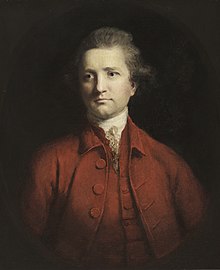Alexander Dow
Alexander Dow | |
|---|---|
 Dow by Joshua Reynolds, 1771 | |
| Born | 1735 or 1736 Crieff, Scotland, Great Britain |
| Died | 31 July 1779 (aged 42-44) Bhagalpur, Bengal, Great Britain |
| Allegiance | Great Britain |
| Years of service | 1760-1769 |
Alexander Dow (1735 or 1736 – 31 July 1779) was a Scottish Orientalist, writer, playwright and army officer in the East India Company.
Life
He was a native of
He returned to Britain on leave in 1768, and published in that year two translations, Tales translated from the Persian of Inatulla of Delhi and the History of Hindostan, translated from the Persian of Ferishta, from Firishta. Both works had a great success, and in the following year Dow had a five-act tragedy on Genghis Khan, Zingis, which was acted with some success at Drury Lane.
He then returned to India, and was promoted lieutenant-colonel on 25 February 1769, and in 1772 published the continuation of his history of Hindostan to the death of
Dow returned once more to India, and died in Bhagalpur on 31 July 1779.
Works
- Tales Translated from the Persian of Inatulla of Delhi (1768)
- Zingis (1769) - 5-act tragedy
- Sethona (1774) - verse tragedy
References
- doi:10.1093/ref:odnb/7957. (Subscription or UK public library membershiprequired.)
- ISBN 9780993470509.
- doi:10.1093/ref:odnb/7957. (Subscription or UK public library membershiprequired.)
 This article incorporates text from a publication now in the public domain: "Dow, Alexander". Dictionary of National Biography. London: Smith, Elder & Co. 1885–1900.
This article incorporates text from a publication now in the public domain: "Dow, Alexander". Dictionary of National Biography. London: Smith, Elder & Co. 1885–1900.
External links
- "Dow, Alexander". doi:10.1093/ref:odnb/7957. (Subscription or UK public library membershiprequired.)
- Persian Tales of Inatulla of Delhi in anthology work, Tales of the East: Continuationof the New Arabian nights. Persian tales [from the translation of F. Pétis de la Croix] Persian tales of Inatulla of Delhi [tr. by A. Dow] Oriental tales [by A. C. P., comte de Caylus] The history of Nourjahad [by Mrs. Frances Sheridan] Additional tales from the Arabian nights, J. Ballantyne and company, 1812, at Google Books
- Sethona. A Tragedy at Google Books
